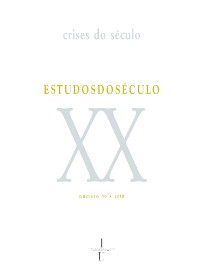Please use this identifier to cite or link to this item:
https://hdl.handle.net/10316.2/36451| DC Field | Value | Language |
|---|---|---|
| dc.contributor.author | Torgal, Luís Reis | - |
| dc.date.accessioned | 2015-04-17T09:42:00Z | |
| dc.date.accessioned | 2020-09-24T05:13:39Z | - |
| dc.date.available | 2015-04-17T09:42:00Z | |
| dc.date.available | 2020-09-24T05:13:39Z | - |
| dc.date.issued | 2010 | - |
| dc.identifier.issn | 1645-3530 | - |
| dc.identifier.issn | 1647-8622 (digital) | - |
| dc.identifier.uri | https://hdl.handle.net/10316.2/36451 | - |
| dc.description.abstract | O conceito de crise é fundamental na história ou no discurso sobre a história. Pode inclusivamente fundamentar a formação de novos regimes e sistema políticos. Foi isso que sucedeu com o fascismo e com outros sistemas próximos de tipo autoritário/totalitário. A crise do regime liberal gerou a formação de conceitos de “estados novos” de tipo social, que começaram por passar pela formação do fascismo italiano e, antes, pela formação do regime soviético. Salazar, como todos os nacionalistas, repudiou o demoliberalismo e o socialismo comunista, mas tentou afastar-se do regime de Mussolini. E, ao logo do seu discurso, foi sempre invocando a “crise” ou “cada crise” para justificar a consolidação do seu sistema, dito “original”, ou para explicar a necessidade da sua persistência. | por |
| dc.description.abstract | La notion de crise est fondamentale dans l’histoire ou dans le discours sur l’histoire. Elle peut même être le fondement de la formation de nouveaux régimes et systèmes politiques. C’est ce qui s’est passé avec le fascisme et d’autres systèmes proches du type autoritaire/totalitaire. La crise du régime libéral a crée la formation de concepts de «nouveaux états» d’un type social, qui ont commencé pour passer par la formation du fascisme italien et, auparavant, par la formation du régime soviétique. Salazar, comme tous les nationalistes, a rejeté le démo-libéralisme et le socialisme communiste, mais a essayé de s’écarter du régime de Mussolini. Et, le long de son discours, a toujours invoqué la «crise» ou « chaque c r i s e » pour justifier la consolidation de son système, soi-disant «original», ou pour expliquer le besoin de sa persistance. | fra |
| dc.description.abstract | The concept of crisis is fundamental in history or in the speech on history. It can even fundament the formation of new regimes and political systems. That was what happened with fascism and other systems close to the authoritarian/totalitarian type. The crisis of the liberal regime generated the concept formation of “new states” of a social type, which startes by passing through the formation of Italian fascism and, before, the formation of the soviet regime. Salazar, as all nationalists, rejected demoliberalism and social communism, but tried to stay away from Mussolini’s regime. And, along his speech, was always invoking the “crisis” or “each crisis” to justify the consolidation of his so-called “original” system or to explain the need of his persistence. | eng |
| dc.language.iso | por | - |
| dc.publisher | Imprensa da Universidade de Coimbra | - |
| dc.subject | Salazar | eng |
| dc.subject | Fascism | eng |
| dc.subject | Estado Novo | eng |
| dc.subject | Crisis | eng |
| dc.subject | Nationalism | eng |
| dc.subject | Salazar | fra |
| dc.subject | Fascisme | fra |
| dc.subject | Estado Novo | fra |
| dc.subject | Crise | fra |
| dc.subject | Nationalisme | fra |
| dc.subject | Salazar | por |
| dc.subject | Fascismo | por |
| dc.subject | Estado Novo | por |
| dc.subject | Crise | por |
| dc.subject | Nacionalismo | por |
| dc.title | «Crise» e «crises» no discurso de Salazar | por |
| dc.title.alternative | Crisis and crises in the speech of Salazar | por |
| dc.title.alternative | Crise et crises dans le discours de Salazar | por |
| dc.type | article | - |
| uc.publication.collection | Revista Estudos do Século XX nº 10 | - |
| uc.publication.firstPage | 397 | - |
| uc.publication.issue | 10 | - |
| uc.publication.lastPage | 419 | - |
| uc.publication.location | Coimbra | - |
| uc.publication.journalTitle | Revista Estudos do Século XX | - |
| dc.identifier.doi | 10.14195/1647-8622_10_23 | - |
| uc.publication.section | Crise ou renovação do republicanismo? | - |
| uc.publication.orderno | 24 | - |
| uc.publication.area | Ciências Sociais | - |
| uc.publication.manifest | https://dl.uc.pt/json/iiif/10316.2/36451/239213/manifest?manifest=/json/iiif/10316.2/36451/239213/manifest | - |
| uc.publication.thumbnail | https://dl.uc.pt/retrieve/11607505 | - |
| item.grantfulltext | open | - |
| item.fulltext | With Fulltext | - |
| Appears in Collections: | Revista Estudos do Século XX | |
Files in This Item:
| File | Description | Size | Format | |
|---|---|---|---|---|
| crise_e_crises_no_discurso_de_salazar.pdf | 1.13 MB | Adobe PDF |  |
Items in DSpace are protected by copyright, with all rights reserved, unless otherwise indicated.
